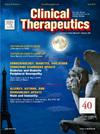Individual, Social and Environmental Factors Influencing Medication-Taking Among Adults of Vietnamese Heritage With Type 2 Diabetes Living in Australia: A Qualitative Study
IF 3.2
4区 医学
Q2 PHARMACOLOGY & PHARMACY
引用次数: 0
Abstract
Purpose
To explore factors influencing diabetes medication-taking among adults of Vietnamese heritage with type 2 diabetes mellitus (T2DM) residing in Australia. Barriers to and enablers of optimal medication use, as perceived by those with diabetes and health professionals working with this community, were explored via the Theoretical Domains Framework (TDF).
Methods
This qualitative study was conducted between November 2021 – March 2023 with input from an advisory group consisting of 4 individuals of Vietnamese heritage (a person living with T2DM, a credentialed diabetes care and education specialist, a General Practitioner, and Nephrologist). Data were collected using semistructured interviews with people with T2DM (adults, living in Australia, Vietnamese country of birth and/or language spoken at home) and focus group discussions with health professionals involved in the care of people with T2DM from Vietnamese background. Recruitment of participants was from a national diabetes registry and/or a tertiary hospital. The 14 domains of the TDF informed the development of the study aim, guided data collection, and thematic analysis. The TDF is a comprehensive framework that can be used to identify barriers and facilitators that influence health behaviors.
Findings
Twenty-three interviews were conducted with adults with T2DM (n = 14 women; median [IQR] age = 60 [16] years; n = 15 insulin-treated; all Vietnamese born, with n = 15 reporting Vietnamese as primary language). One focus group was undertaken with each group of health professionals (n = 7 doctors - 5 endocrinologists and 2 advanced endocrinology physician trainees, n = 6 credentialed diabetes care and education specialists, and n=3 pharmacists). A wide range of themes about the barriers and enablers [determinants] of medication taking were generated and mapped on 13 of 14 Theoretical Domains Framework domains, only excluding the domain of ``goals.'' The most important (determined through frequency and richness) domains that influenced medication-taking were: Environmental Context and Resources-access to subsidized medications is facilitated via the Australian Pharmaceutical Benefits Scheme, but high costs remained a significant barrier for many. Emotion-participants reported anxiety about diabetes complications as a motivator for medication-taking, while fears about long-term side effects created barriers. Social Influences-family support was an enabler of medication-taking. However, lack of support and pressure to use alternative treatments posed barriers for some participants. Beliefs About Consequences- belief in the negative outcomes of missed doses motivated medication-taking, while a lack of immediate side effects from missed doses reinforced perceptions that skipping medication was harmless. Memory, attention, and decision making-participants prioritized certain medications, sometimes neglecting others they viewed as less important.
Implications
Medication-taking among adult Australian Vietnamese individuals with T2DM is influenced by a complex interplay of environmental, social, and individual factors. This study identified potentially relevant domains that can guide future interventions to enhance medication-taking in this population.
求助全文
约1分钟内获得全文
求助全文
来源期刊

Clinical therapeutics
医学-药学
CiteScore
6.00
自引率
3.10%
发文量
154
审稿时长
9 weeks
期刊介绍:
Clinical Therapeutics provides peer-reviewed, rapid publication of recent developments in drug and other therapies as well as in diagnostics, pharmacoeconomics, health policy, treatment outcomes, and innovations in drug and biologics research. In addition Clinical Therapeutics features updates on specific topics collated by expert Topic Editors. Clinical Therapeutics is read by a large international audience of scientists and clinicians in a variety of research, academic, and clinical practice settings. Articles are indexed by all major biomedical abstracting databases.
 求助内容:
求助内容: 应助结果提醒方式:
应助结果提醒方式:


